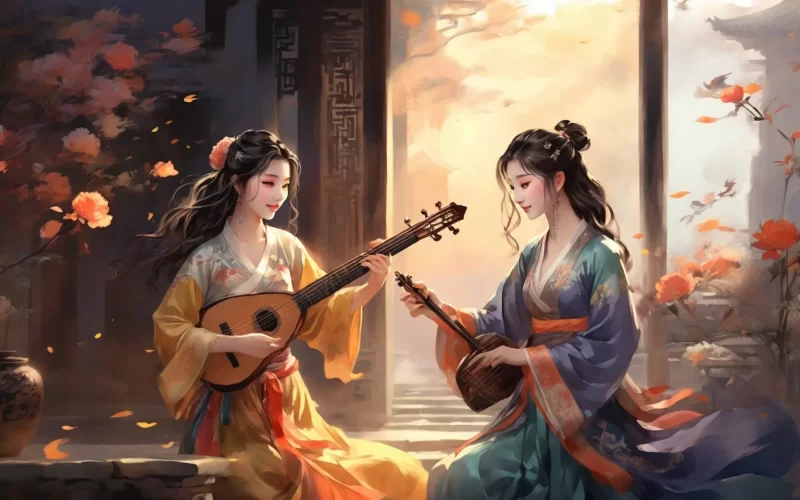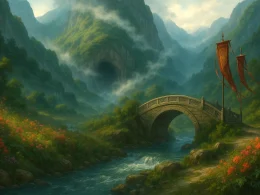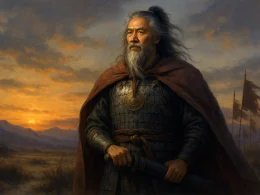They sing, they drain their cups of jade,
They strum on horseback their guitars.
...Why laugh when they fall asleep drunk on the sand ? --
How many soldiers ever come home?
Original Poem
「凉州词」
王昌龄
葡萄美酒夜光杯,欲饮琵琶马上催。
醉卧沙场君莫笑,古来征战几人回。
Interpretation
Composed during the Kaiyuan era of the Tang Dynasty, this poem captures the poignant revelry of frontier soldiers amidst constant warfare. Wang Han, a talented yet unappreciated poet known for his unconstrained personality and love of wine, here portrays a military banquet scene where warriors drink in the shadow of impending battle. The "Song of Liangzhou" was originally a Central Asian melody from the Liangzhou region (modern Wuwei, Gansu) that became a popular vehicle for frontier poetry during the High Tang period.
First Couplet: "葡萄美酒夜光杯,欲饮琵琶马上催。"
Pútáo měi jiǔ yèguāng bēi, yù yǐn pípá mǎshàng cuī.
Grape wine in luminous cups aglow, The pipa's call urges us to go.
This couplet juxtaposes sumptuous banquet imagery (exotic grape wine, luminous cups) with the urgent call to battle (the pipa's martial tune). The Central Asian elements highlight the cultural fusion at the frontier, while the abrupt transition from feasting to departure underscores the soldiers' precarious existence.
Second Couplet: "醉卧沙场君莫笑,古来征战几人回。"
Zuì wò shāchǎng jūn mò xiào, gǔ lái zhēngzhàn jǐ rén huí.
Laugh not if drunken on sands we lie - How many who march to war return?
The concluding lines shift from bravado to profound resignation. The soldiers' drunkenness becomes both defiance and acceptance of their likely fate, encapsulating the tragic grandeur of frontier life where revelry and mortality are inseparable companions.
Holistic Appreciation
Though only four lines long, this poem masterfully layers scene and emotion, unfolding the intertwined joys and sorrows of frontier military life with its capricious fortunes. The first half depicts a feast—vibrant with color, music, and revelry—while the latter shifts abruptly to cold reminders of death and somber reflection. This dramatic turn from ecstasy to anguish creates a heart-wrenching tension. The line "Laugh not if we lie drunk on the battleground" is particularly striking, wrapping profound mortality in dark humor—its surface bravado concealing deep sorrow, its boldness laced with grief—epitomizing the High Tang spirit.
Artistic Merits
The poem employs stark contrasts for powerful impact, pivoting sharply from the festive atmosphere of "jade wine cups brimming with grape wine" to the existential sigh of "mock us not on the sands of war." Vivid frontier imagery—"grape wine," "jade cups," "pipa lutes"—reflects the cultural openness of the High Tang borderlands. Its language is distilled yet potent, each line piercing the heart; though unadorned, it resonates deeply. Most remarkable is how the poet masks sorrow with seeming nonchalance—heroic tones veiling profound lament—making the work both artistically compelling and emotionally layered.
Insights
This poem celebrates soldiers’ fearless valor while exposing war’s devastating toll. It reminds us: beneath glittering surfaces often lurks life’s cruelty; behind boisterous toasts may hide unspoken grief. Here lies a timeless insight into life’s impermanence, as well as an ode to heroic resolve. In just twenty-eight characters, the poet bequeaths a legacy of "living like summer blooms, dying like autumn leaves"—a poignant blend of transcendence and tragedy.
Poem translator
Kiang Kanghu
About the poet
Wang Han (王翰) was a native of Taiyuan, Shanxi Province. He was admitted as a scholar in 710 AD. He was known for his unrestrained talent and his boldness, and his poems were full of magnificent words. He was known for his boldness, and his poems were full of magnificent words. The scribes Zu Yong and Du Hua were his companions. He had a high reputation at that time.












